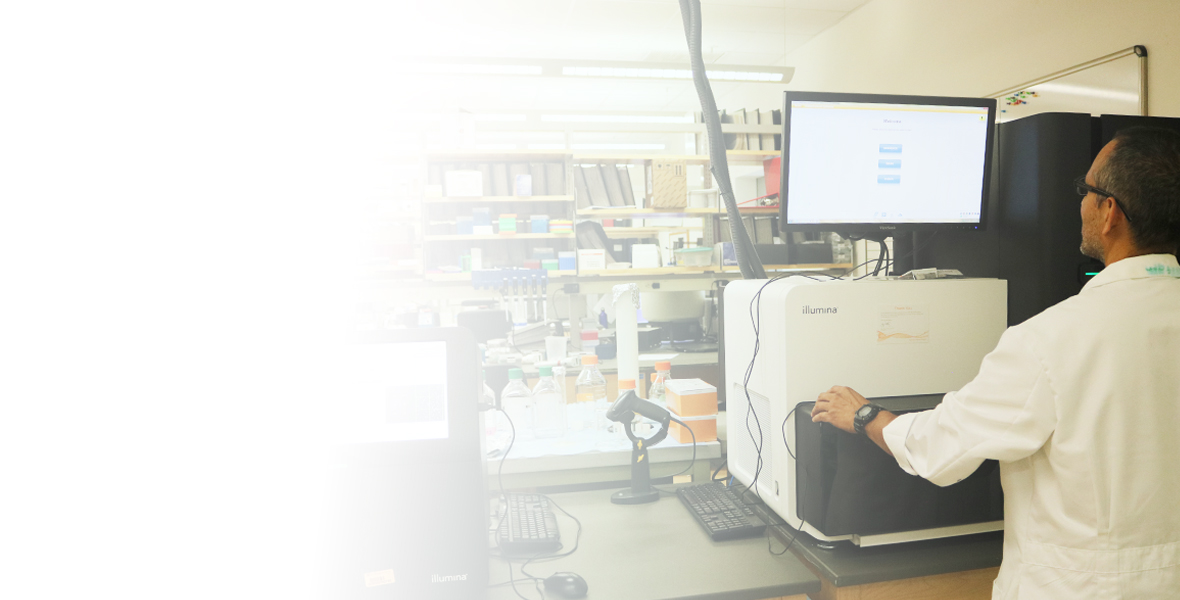ICBR Contributes to First Genomic Sequence of COVID-19 in New Orleans, LA
While clinicians are working on the front lines to treat patients with COVID-19, researchers are working behind the scenes, investigating the viral life cycle and advancing new developments in therapeutics and vaccines. Critical to this research effort is determining the genetic code the virus uses for infection and propagation.
UF | ICBR is doing its part to provide essential services to drive this research further; delivering support not only locally, but on a national scale. In a recent collaboration with scientists from BioInfoExperts LLC (BIE) and Ochsner Health, the UF | ICBR NGS Core successfully determined the entire genetic sequence for two COVID-19 isolates obtained from infected individuals from the New Orleans area.
New Orleans emerged as a COVID-19 hot spot in late March, and researchers anticipate studying the RNA of the virus will reveal more about its progression and possible treatment. Studying the viral genome enables scientists to track viral spread and identify potential mutations that weaken or strengthen the ability the virus to infect, modulate disease severity, or enhance spread.
“This is a great example of the value the ICBR has in providing cutting-edge biotechnology and extensive experience to support important research within the UF community.” Says Dr. Steven Madore, UF | ICBR Associate Director for Science. “In the hands of experts like Dr. Moraga, the Illumina-based sequencing technology can provide cost-effective, extremely high-quality sequencing data for research projects like this one.”
For COVID-19, the genetic material is not DNA but rather a single molecule of RNA that contains all the genetic information required for replication and infection. Like all viruses, COVID-19 hijacks the protein synthesis machinery of the infected cell. The viral RNA is used by the cell as a template during normal protein synthesis to make all the viral proteins required for assembling new virions. Determining the genetic code contained in the viral RNA enables scientists to predict the structure and function of the proteins. This information is vital for identifying key regions in the viral proteins that can be targeted by new drugs or used as potential antigens in vaccine development.
The genetic code for COVID-19 can be determined by converting the RNA molecule into DNA, and then analyzing the DNA using next generation sequencing (NGS) technologies.
Researchers from BIE (UF Innovate | Sid Martin) and Ochsner Health (Louisiana) leveraged the sequencing experience and technologies (Illumina NextSeq 500) at UF | ICBR to use a cloud-based software which uses bacterial genomes to track infection through a process called “Precision Epidemiology.”
“Together, our teams are utilizing high-throughput technology and advanced analytics that will enable us to better understand and treat COVID-19. Similarly to how Ancestry.com uses human DNA to find out where people come from, we are studying the building blocks or RNA of this specific virus to find out how it compares to the larger global epidemic,” said Susanna Lamers, CEO of BIE.”
Researchers aim to sequence more genomes in the following weeks, further examining the New Orleans outbreak and how Mardi Gras may have contributed to its spread. These discoveries will benefit the effort to sequence SARS-CoV-2 genomes across the world in order to develop effective vaccines.
UF Innovate | Sid Martin Biotech Press Release
Check this out: the genomes mentioned in this article can be found in this phylogeny showing the evolutionary relationships of hCoV-19 (or SARS-CoV-2) viruses from the ongoing novel coronavirus COVID-19 pandemic: https://nextstrain.org/ncov/global


